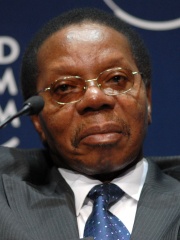
The Most Famous
ECONOMISTS from Malawi
This page contains a list of the greatest Malawian Economists. The pantheon dataset contains 414 Economists, 1 of which were born in Malawi. This makes Malawi the birth place of the 37th most number of Economists behind Belarus, and Finland.
Top 1
The following people are considered by Pantheon to be the most legendary Malawian Economists of all time. This list of famous Malawian Economists is sorted by HPI (Historical Popularity Index), a metric that aggregates information on a biography's online popularity.

1. Bingu wa Mutharika (1934 - 2012)
With an HPI of 66.95, Bingu wa Mutharika is the most famous Malawian Economist. His biography has been translated into 57 different languages on wikipedia.
Bingu wa Mutharika ( moot-ə-REE-kə; born Brightson Webster Ryson Thom; 24 February 1934 – 5 April 2012) was a Malawian politician and economist who served as the third president of Malawi from 2004 until his death in 2012. A member of the Democratic Progressive Party (DPP), he served as the party's president from 2005 to 2012, and was also the eighth chairperson of the African Union from 2010 to 2011. Born in Thyolo District, Mutharika was educated in India and the United States in the 1960s where he graduated from the University of Delhi with a master of Arts degree in economics. Mutherika later entered the civil service as where he served as an administrative officer in the Governments of Malawi and Zambia, and also worked at the World Bank as a Loans Officer and at the United Nations Economic Commission of Africa, as Director of Trade and Development Finance and as Secretary General of the Common Market for Eastern and Southern Africa (COMESA). In 2004, President Bakili Muluzi nominated Mutherika for the presidency as the candidate for the United Democratic Front (UDF) in the 2004 presidential election, where Mutherika subsequently won and was elected president, defeating John Tembo of the Malawi Congress Party (MCP). During Mutharika's first term, Malawi's economy experienced steady growth, inflation fell, and the poverty rate declined. In 2005, Mutharika left the UDP following a dispute and founded the Democratic Progressive Party (DPP). A fertiliser subsidy program was also introduced that significantly boosted maize production and improved food security. Democratic governance also increased during this timem All of this won Mutharika public support, espacially in the rural areas, and by 2009, he became one of Africa's most popular presidents. In 2009, Mutharika was re-elected president, defeating John Tembo again. Mutharika's second term was marked by democratic backsliding, declining popularity, economic mismanagement, and increased political infighting. While the economic growth of Mutharika's first term continued early on, the economy started to stagnate and eventually decline. The cost of living in the countey started rising, as well as shortages of fuel, electricity, water, and foreign exchange, along with increasing tension with international donors. Mutharika also faced criticism for increasingly authoritarian governance and behaviour. Tensions in the DPP also grew between Mutharika and some party members, most notably his vice president, Joyce Banda, whom Mutharika tried firing many times from 2010, which eventually grew after she refused to endorse Mutharika's brother, Peter, to succeed him. Banda was eventually kicked out of the party and she founded the People's Party. In 2011, public discontent with the government grew and protests occurred due to the cost of living crisis, which Mutharika used security forces to crack down, allegedly killing 19 and injuring 58. In April 2012, Mutharika died after a short illness, thus becoming the first Malawian head of state to die in office. After his death, a two day constitutional crisis occurred, where Mutharika's younger brother, Peter, attempted to gain the presidency over Vice President Banda despite the move being controversial and unconstitutional. However, Banda was sworn in as president with the support of the military according to the law. While Mutharika is praised for strengthening democratic governance and growing the economy earlier in his presidency, he is also criticised for his increasing authoritarian style of governence, supressing of dissent and for the economic crisis later on.
People
Pantheon has 1 people classified as Malawian economists born between 1934 and 1934. Of these 1, none of them are still alive today. The most famous deceased Malawian economists include Bingu wa Mutharika.

